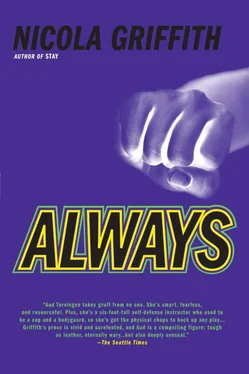Caps popped as they came off and the air filled with Sharpie scent— Tonya sniffed hers meditatively; she’d have a headache later—there were lots of faraway looks, some scribbling. Sandra’s pen moved vigorously but never touched the paper.
“Time’s up. Cap the pens, please, and pass them back to me.”
“What do we do with the cards?”
“Hand them to Nina.” There was some standing, some timing of the thrust of card from their hand to Nina’s: attempts to disguise who had given what. “Nina, shuffle them and give them to me.”
She did. While they sat down again, I sorted the cards rapidly into the yes pile, three; the no pile, six; and the blank card. I set the cards to one side, facedown.
“According to the 1985 London WAR study, eighty-one percent of women sometimes or often feel frightened at home alone in the daytime. This percentage rises for when we’re outside or it’s night or both.” I looked around the circle, waiting until everyone but Sandra stopped looking at the cards and met my eye. “So what, exactly, are we afraid of?”
Sandra lifted her head. Her face was waxy with intensity, the tiny muscles in her brown irises pulled so tight that in this bad light the plump fibers had an amber sheen. I’d seen a woman look like that once whose boyfriend had their son in a cupboard with a gun against his head. She was ashamed. She couldn’t tell me; she wanted me to know.
“In an earlier class I gave you Department of Justice statistics on the chances of avoiding rape if you fight back.”
“Seventy-two percent if he’s unarmed, fifty-eight percent if armed with a knife, fifty-one if armed with a gun,” said Tonya.
“Many of you expressed surprise at that.” Nods. “That’s because the information we get, every day, from TV and newspapers and online, is all about the rapes that are completed, the lives lost, the pain suffered—preferably with blood and body parts and panicky eyewitness accounts. Why? Because that’s what gets an audience, and the bigger the audience, the more the media can charge for their commercials. More than eighty percent of us spend our lives afraid because that helps soap makers and computer manufacturers sell product.”
“Same old same old,” Nina said. “The military-industrial complex.”
“The capitalist system,” Christie said. I couldn’t have been more surprised if she’d turned purple and exploded. “Someone was talking about this at school last semester. The patriarchy.”
“The patriarchy,” Nina said. “Haven’t heard that word since I did women’s studies in college.”
“They had college back then?” Pauletta said.
Nina ignored her; she was getting excited. “I remember now. Some big feminist, one of those dead ones, said men teach us to be afraid to control us.”
Andrea Dworkin: “We are taught systematically to be afraid. We are taught to be afraid so that we will not be able to act, so that we will be passive, so that we will be women… ,” in Our Blood, though I had no doubt she’s said it in some form or other in all her books. The male conspiracy against women. When it came to the media I had always thought corporate greed was a much simpler explanation.
“It’s been estimated that the media publicize thirteen completed rapes for every attempted but uncompleted rape. If you round up the chance of getting away from an unarmed attacker from seventy-two to seventy-five percent, that means you have a three in four chance of getting away.”
“Or kicking his fucking head in,” Suze said.
“And then if you take the thirteen-to-one completed-versus-uncompleted -rape media figure, it means that the papers and the news underreport fight-back stories by five thousand two hundred percent.”
“Math makes my head hurt,” said Katherine.
“Imagine you’re listening to WSB while you drink your mocha and drive to work. Imagine it’s a slow news day, so you hear about a grand-mother who fought off a rapist with her umbrella. Think about the other fifty-one women who got away.”
Tonya got it. Her eyes shone, and it was a different shine than Sandra’s. “Much of what we call fear is actually worry about imaginary situations, ” I said. “It’s learned. It can be unlearned. When you read about someone being raped, remember the three others who got away. On those rare occasions where you do hear about a woman getting away, remember the fifty-one others who did, too. Better yet, don’t read or listen to that kind of news.”
“Not listen to the news?” Jennifer looked shocked.
“The news exists to make people anxious, so that they keep watching, so that the provider—the website, the network, the publisher—can sell advertising space. But anxiety and worry are not the same as fear. There’s very little useful about them. Worry, or stress, or anxiety are responses to long-term or persistently imagined danger, not real danger, not immediate danger. Horror and dread, again, aren’t usually about the immediate, but about the future: the suspense of waiting for what you think will come. Note that: think. When you lie awake at night and start imagining mad axe murderers or hooded rapists, we’re not smelling them, not hearing them, not feeling the vibration of their footsteps.”
I picked up the cards and turned them over.
“Let me tell you something about what’s written on these cards. The ones with no in the bottom right list fears like ‘being raped,’ ‘being followed, ’ ‘dark places,’ and so on. Do you see any similarities between them?” I waited.
“Horror-movie stuff,” Tonya said. “Kind of generic.”
“Yes,” I said. “The ones who wrote yes were more specific.”
“Like what?” Suze, one of the Nos.
“Waking in my hotel room to find the bellboy exposing himself, my old boyfriend getting drunk and paying me a visit, being beaten with a garden rake.” I looked around the circle of faces. Therese and Kim’s faces were closed, Nina looked particularly detached. “Some of you seem unhappy.”
“You just said we’re afraid of make-believe things,” Pauletta said.
“Those of you who have never been assaulted are worrying about the wrong things. You’ve paid for my advice, so listen to me now. Fear is a good thing, worrying about fear is not. All right. On your feet.”
“What?”
“Up.” I stood. “Stand in a big circle. Good. Fear releases adrenaline. Adrenaline will make your heart pound, and make you pant. It’s the panting that leads to hyperventilation, which leads to passing out. Some people pass out because they’re so frightened, they forget to breathe at all. So if you’re not breathing, start. A good way to do that is to exhale sharply, even if you feel you’ve got no air, and that’ll trigger an inhalation. It’s enough to get you going. But then you have to not hyperventilate. I’m going to show you how.”
Their chests rose and fell with rapid, shallow breath.
“Stand in a stable, comfortable position. Push your tongue up into the roof of your mouth and clamp your back teeth together. This will control your jaw and neck muscles, in case you’re shaking, and also, if you get hit on the jaw, it’s less likely to break. Keep your back straight.” Their notion of straight was pitiful. “Try to feel your spine in one long line, like a plumb line. Don’t stick your chin in the air because that will put a strain on your vocal cords, which we’ll need nice and relaxed for later.” Though there was a good physiological argument, too, for lifting the chin: it reduced the emotional response and promoted blood flow to the frontal cortex. But one thing at a time. “Keep your shoulders down. Not only does that look more confident and relaxed but it reduces muscle tension and therefore speeds any emergency response. Breathe through your nose, breathe deep from the diaphragm. Feel your belly swell. Put your hand on your stomach. There.” I walked around, adjusting posture. “Make that hand move out. Your chest should hardly move at all. In through the nose, deep and slow, your belly swells. Out, a long gush through the mouth. In, deep and slow, and out. In. Out.”
Читать дальше












